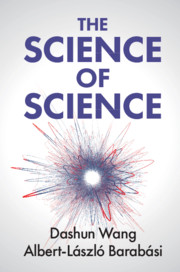Book contents
- The Science of Science
- The Science of Science
- Copyright page
- Dedication
- Contents
- Acknowledgements
- Introduction
- Part I The Science of Career
- Part II The Science of Collaboration
- Part III The Science of Impact
- Part IV Outlook
- 21 Can Science Be Accelerated?
- 22 Artificial Intelligence
- 23 Bias and Causality in Science
- Last Thought: All the Science of Science
- Book part
- References
- Index
21 - Can Science Be Accelerated?
from Part IV - Outlook
Published online by Cambridge University Press: 07 February 2021
- The Science of Science
- The Science of Science
- Copyright page
- Dedication
- Contents
- Acknowledgements
- Introduction
- Part I The Science of Career
- Part II The Science of Collaboration
- Part III The Science of Impact
- Part IV Outlook
- 21 Can Science Be Accelerated?
- 22 Artificial Intelligence
- 23 Bias and Causality in Science
- Last Thought: All the Science of Science
- Book part
- References
- Index
Summary
We ask if it’s possible to accelerate the advancement of science by applying the science of science to the frontiers of knowledge. Using a robot scientist as an example, we show how it is now possible to close the loop by building machines that can create scientific knowledge. We discuss the implications of this on the future of the discipline. Another way to more efficiently advance science is to generate more fruitful hypotheses. We discuss the Swanson hypothesis, which provides a window into how to hone in on valuable discoveries, allowing for the forecasting of frutiful areas of research. We then explore how the frontiers of science can be traced, allowing scientists to more thoughtfully choose topics that will accelerate collective discovery. Finally, we address some challenges posed by this issue, including the “file drawer problem,” which could be mitigated by a more systemic approach to sharing negative results with colleagues in the discipline. We suggest several ways to incentivize and reward impactful science so that we can efficiently reap its benefits.
Keywords
- Type
- Chapter
- Information
- The Science of Science , pp. 223 - 230Publisher: Cambridge University PressPrint publication year: 2021



